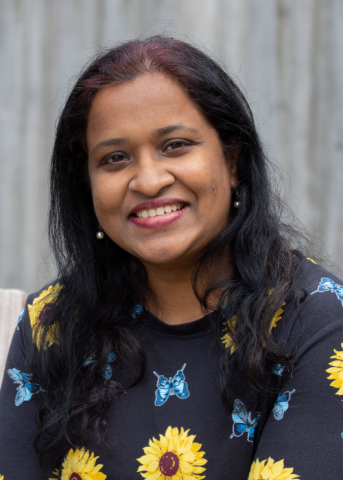What interested you in studying public health and why are you passionate about it?
My life-changing experience started as a medical student and resident at Christian Medical College in Vellore, India. During my community health posting, I volunteered to map the villages in Vellore using the then novel Global Information System which was deployed as a part of a project that mapped patients with Dengue and the mosquito burden. As a sub study, I also collected drinking water samples from wells in ten villages for microbiological analysis after learning there were high rates of diarrhea. Samples showed higher than acceptable levels of coliform bacteria and with the help of the authorities, I initiated corrective measures that reduced the diarrhea burden in those areas. This gratifying experience was my first ever taste in epidemiology and the beginning of a passionate subject for me.
What’s your favorite aspect about studying public health and why?
Working in public health is rewarding to me because I have seen far more impact in prevention and early diagnosis through my recent work than as an internal medicine clinician in India. The patients I saw at my clinical practice were from marginalized communities and lacked access to affordable prevention care and early diagnostics. They would come to the clinic at later stages of a disease, which was more difficult to treat.
Working as a clinical advisor with an artificial intelligence (AI) firm in 2016 made me realize the true potential of public health. I used my clinical experience in resource-limited settings in India and knowledge about the gaps in diagnosis and surveillance of diseases like tuberculosis and strokes to train the data scientist team on developing various AI algorithms for imaging. These algorithms detect various abnormalities on imaging like chest x-rays and CT brain scans in seconds and can efficiently reduce diagnosing times and costs.
How do you want to change the world with your degree?
I am convinced that choosing a career path that is a conduit between medicine and data science is the right one for me. With in-depth epidemiology training and clinical experience, I will be able to use data application concepts at a population level to bridge some of the gaps and challenges of global importance, especially in resource-limited settings.
What experiences at the UW SPH have been most influential?
UW SPH has been doing exceptional work and research in the field of epidemiology across the world. The depth and diversity of the research conducted in various departments such as epidemiology, global health and biostatistics, alongside various research centers like the Institute for Health Metrics and Evaluation, Fred Hutchinson Cancer Research Center, Tuberculosis Research and Training Center, and organizations like the Bill & Melinda Gates Foundation is mind-boggling. These types of resources have given me opportunities to explore topics that I have never had access to learn before like using modeling and programming in my research.
Why did you choose the UW?
The master’s program at the UW is well-known for its interdisciplinary aspects, and rigorous hands-on training of students from faculty and other opportunities. My final decision to join the UW was reinforced when I was also given a research assistant position at the START Center (Strategic Analysis, Research and Training Center) with the Department of Global Health. This allows me to work with clients like the Bill & Melinda Gates Foundation, the World Health Organization, PATH etc.
What interests do you have outside of (or related to) public health? Any extracurricular activities?
I am a mom of two girls; a 10- and 4-year-old and I love spending time with them. I love experimenting with recipes from various cuisines, and listening to various genres of music, of which K-pop has been the latest addition. I also enjoy traveling.
What is one piece of advice that you have for potential new public health students or one thing you wish you knew before beginning your public health studies?
I was very nervous about transitioning to a new country with my children, but the support and understanding from the faculty and peers in the departments has been incredible, making this transition smooth. Regarding studies and career trajectory, this opportunity has opened up so many possibilities for networking and growth that I couldn’t even dream about. With passion and of course, a little bit of hard work, there is no stopping you.

